
The Anthomyiidae are a large and diverse family of Muscoidea flies. Most look rather like small houseflies. Most species are drab grey to black. Many Pegomya are yellow, and some members of the genera Anthomyia and Eutrichota are patterned in black-and-white or black-and-silvery-grey. Most are difficult to identify, apart from a few groups such as the kelp flies that are conspicuous on beaches.
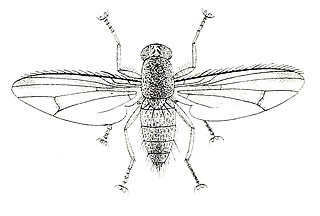
The Curtotonidae or quasimodo flies are a small family of small grey to dark brown humpbacked flies (Diptera) with a worldwide distribution, but with very few species in the Nearctic, Australasian/Oceanian, and Palaearctic regions. Most members of the family are found in tropical to subtropical latitudes in Africa and the Neotropics. Many remain undescribed in collections, since little work on the family has been done since the 1930s.

The Ecnomidae are a family of caddisflies comprising 9 genera with a total of 375 species.

Alastor is a Palearctic, Indomalayan and Afrotropical genus of potter wasps, primarily found in tropical Africa. It is divided into the 4 subgenera Alastor, Alastorellus, Megalastor and Parastalor.

Psychopsidae is a family of winged insects of the order Neuroptera. They are commonly called silky lacewings.
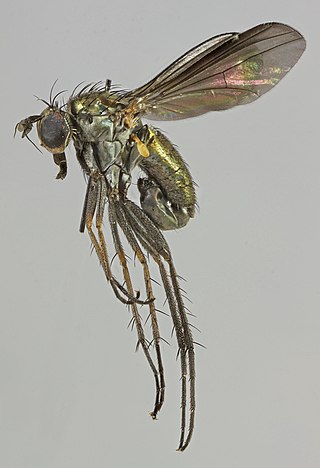
Hercostomus is a genus of flies in the family Dolichopodidae. It is a large genus, containing more than 483 species worldwide. Multiple studies have shown that Hercostomus is a polyphyletic assemblage of species.
Nurteria is a genus of flies in the family Dolichopodidae, found in the Afrotropical realm. Three species are currently known in the genus, but there are also numerous undescribed species of the genus from southern Africa. It was originally described in the subfamily Diaphorinae, though it possesses some features of the Sympycninae.

Feroponera is a monotypic Afrotropical genus of ants in the subfamily Ponerinae containing the single species Feroponera ferox. The genus is known only from a few specimens collected from an unoccupied termitary in Cameroon.

Meromacroides is a monotypic genus of Afrotropical hoverfly from the family Syrphidae, in the order Diptera.
Ceratricula is a genus of butterflies in the family Hesperiidae. It is monotypic, being represented by the species Ceratricula semilutea, commonly known as the tufted forest sylph which is found in Guinea, Sierra Leone, Liberia, Ivory Coast, Ghana, Nigeria, Cameroon, Gabon, the Central African Republic, the Democratic Republic of the Congo, Uganda, north-western Tanzania and north-western Zambia. The habitat consists of forests.

Paraparatrechina is a genus of small ants in the subfamily Formicinae. The genus contains 39 species distributed in the tropics of Africa, Asia and Australia.
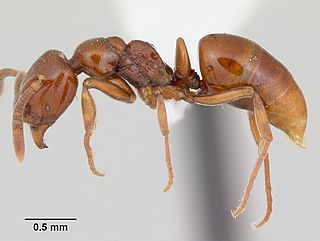
Asphinctopone is a small genus of rarely encountered Afrotropical ants in the subfamily Ponerinae.

Promyopias is an Afrotropical genus of ant in the subfamily Ponerinae containing the single species Promyopias silvestrii. The rare genus has previously been regarded as a separate genus, as a subgenus and as a provisional synonymy, but was reinstated at genus-rank in 2008.

Phrynoponera is a strictly Afrotropical genus of ants in the subfamily Ponerinae.

Phrynoponera gabonensis is an Afrotropical species of ant in the subfamily Ponerinae. P. gabonensis is the most common, widely distributed and frequently encountered member of the genus Phrynoponera. Specimens are usually retrieved from leaf litter samples but also occur in pitfall traps. The species is known to nest in and under rotten wood, in compacted soil and in termitaries.
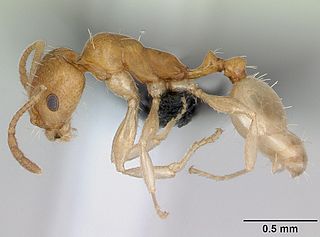
Royidris is a Malagasy genus of ants in the subfamily Myrmicinae. Described in 2014, the genus contains 15 species endemic to Madagascar.
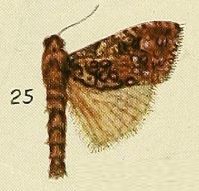
The Metarbelidae are a family of the Cossoidea also called the carpenter or goat moths, and is sometimes treated as a subfamily, Metarbelinae of the Cossidae. No synapomorphies are shared with the Cossidae based on adult morphology. The family Metarbelidae was first described by Embrik Strand in 1909.

Wanda Wesołowska is a Polish zoologist known for her work with jumping spiders. She has described more species of jumping spider than any contemporary writer, and is second only to Eugène Simon in the history of arachnology. Originally a student of ornithology, she developed an interest in jumping spiders while still a student at the Siedlce University of Natural Sciences and Humanities in the 1970s.

Epimetopidae is a family of semi-aquatic beetles belonging to the Hydrophiloidea. They are found in sand and gravel at the edges of streams, rivers and shallow freshwater ponds. These beetles are shorter than half a centimeter long and have a pronotum with a central projection forming a shelf above the head. On the underside of the abdomen only four sternites are visible. There are approximately 72 described species in three genera, Epimetopus which is restricted to the New World, mostly Neotropical, Eupotemus with two Afrotropical species and Eumetopus with some Oriental species. Females carry their eggcases on the underside of the abdomen. The larvae are probably carnivorous based on their mouthparts and likely live in the same habitats as the adults.
Pseudagris is an Afrotropical genus of large potter wasps, formerly treated as a subgenus within Synagris.














